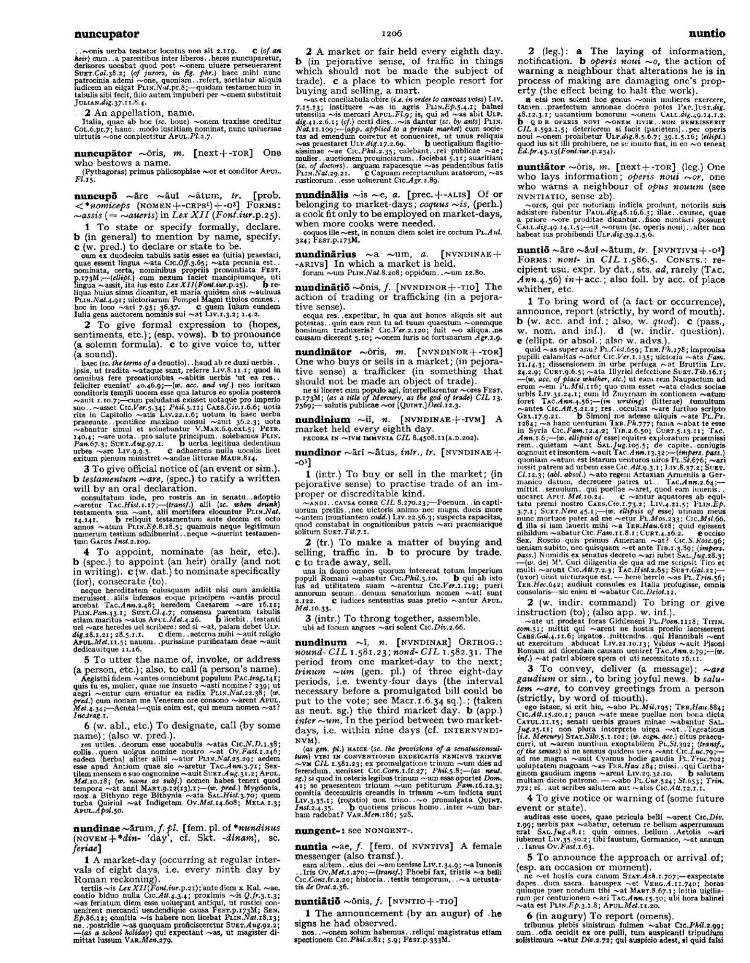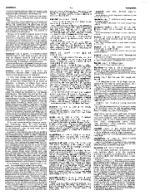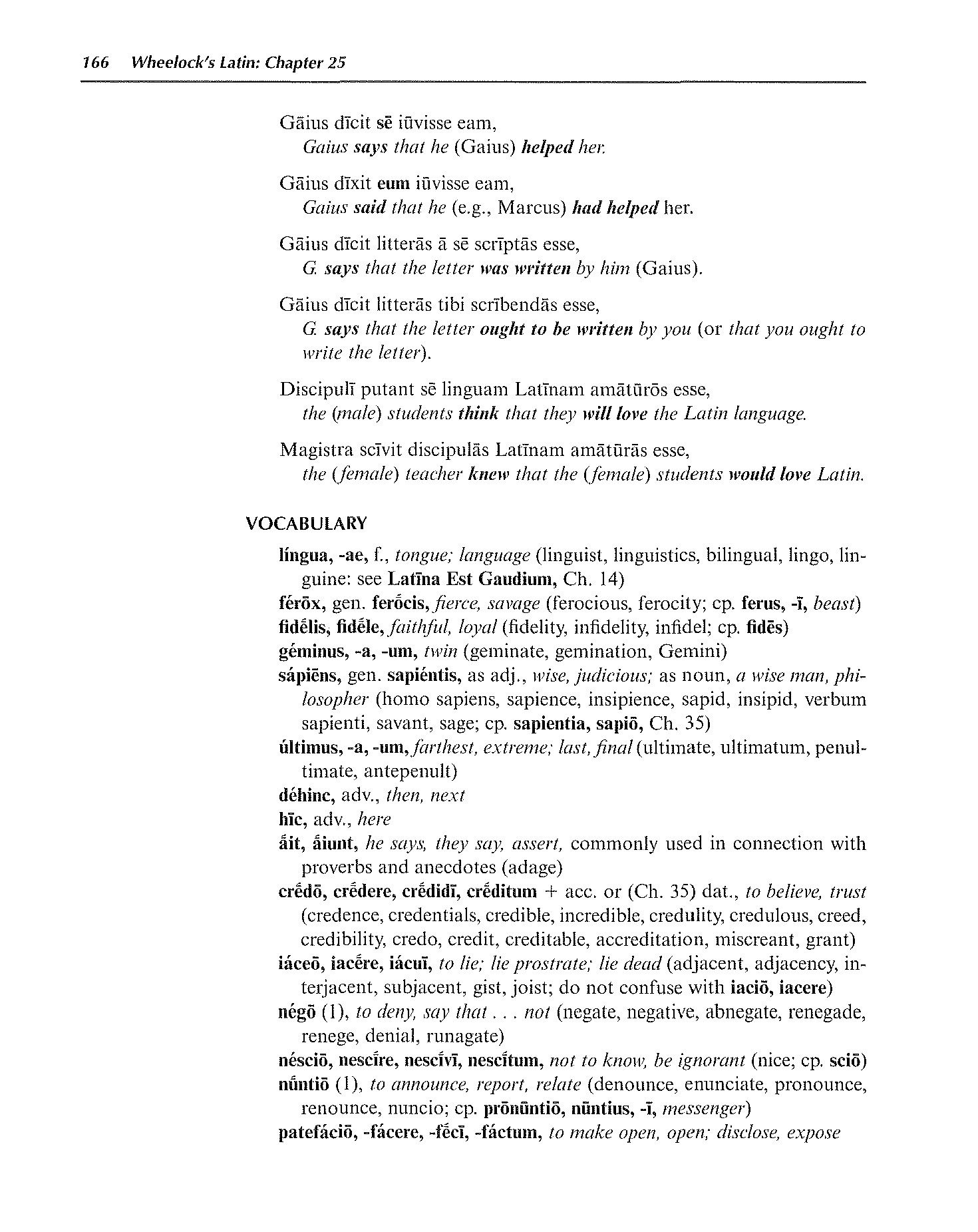
page_listing.tpl
page_subListingDetails.tpl
sub_listingDetails_style1.tpl
sub_listingDetails.title.tpl
nūntiāre to announce
nūntiāre is a Latin Verb that primarily means to announce.
Definitions for nūntiāre
Wheelock's Latin
Verb
- 1
to announce, report, relate
English derivatives:
denounce enunciate pronounce renounce nuncio
Oxford Latin Dictionary
Verb
- 1
To bring word of (a fact or occurrence), announce, report (strictly, by word of mouth). (b) (w. acc. and inf.; also, w. quod). (c) (pass., w. nom. and inf.). (d) (w. indir. question). (e) (ellipt. or absol.; also w. advs.).
- 2
(w. indir. command) To bring or give instruction (to); (also app. w. inf.)
- 3
To convey, deliver (a message); ~are gaudium or sim., to bring joyful news. (b) salutem ~are, to convey greetings from a person (strictly, by word of mouth).
- 4
To give notice or warning of (some future event or state).
- 5
To announce the approach or arrival of; (esp. an occasion or moment).
Sentences with nūntiāre
Latin to English
Nūntiāvērunt ducem quam fortissimum vēnisse.Compare They announced that the bravest possible leader had come.
Ducī nūntiāvimus cēterōs mīlitēs in illam terram fugere (fūgisse).Compare We announced to the leader that the other soldiers were fleeing (had fled) into that land.
Marcus nūntium in villam ducit.Compare Marcus leads the messenger into the house.
Prodigium interim multus nuntio.Compare Meanwhile many prodigies began to be reported.
Sanguis pluit senatus nuntio.Compare It was reported to the senate that it had rained blood.
Currens Lepta venio, egoque nuntio tui iam castra praetergredior.Compare Lepta came running, and announced to me that you had already passed the camp.
Conjugation table for nūntiāre
Cactus2000
| ACTIVE | |
| Indicative present | Indicative imperfect |
| nūntiō nūntiās nūntiat nūntiāmus nūntiātis nūntiant | nūntiābam nūntiābās nūntiābat nūntiābāmus nūntiābātis nūntiābant |
| Indicative perfect | Indicative pluperfect |
| nūntiāvī nūntiāvistī nūntiāvit nūntiāvimus nūntiāvistis nūntiāvērunt / nūntiāvēre | nūntiāveram nūntiāverās nūntiāverat nūntiāverāmus nūntiāverātis nūntiāverant |
| Indicative future | Indicative future perfect |
| nūntiābō nūntiābis nūntiābit nūntiābimus nūntiābitis nūntiābunt | nūntiāverō nūntiāveris nūntiāverit nūntiāverimus nūntiāveritis nūntiāverint |
| Subjunctive present | Subjunctive imperfect |
| nūntiem nūntiēs nūntiet nūntiēmus nūntiētis nūntient | nūntiārem nūntiārēs nūntiāret nūntiārēmus nūntiārētis nūntiārent |
| Subjunctive perfect | Subjunctive pluperfect |
| nūntiāverim nūntiāveris nūntiāverit nūntiāverimus nūntiāveritis nūntiāverint | nūntiāvissem nūntiāvissēs nūntiāvisset nūntiāvissēmus nūntiāvissētis nūntiāvissent |
Infinitive present nūntiāre Infinitive perfect nūntiāvisse Infinitive future nūntiātūrum esse | Imperative present nūntiā nūntiāte Imperative future nūntiātō nūntiātō nūntiātōte nūntiantō |
| PASSIVE | |
| Indicative present | Indicative imperfect |
| nūntior nūntiāris nūntiātur nūntiāmur nūntiāminī nūntiantur | nūntiābar nūntiābāris / nūntiābāre nūntiābātur nūntiābāmur nūntiābāminī nūntiābantur |
| Indicative perfect | Indicative pluperfect |
| nūntiātus sum nūntiātus es nūntiātus est nūntiātī sumus nūntiātī estis nūntiātī sunt | nūntiātus eram nūntiātus erās nūntiātus erat nūntiātī erāmus nūntiātī erātis nūntiātī erant |
| Indicative future | Indicative future perfect |
| nūntiābor nūntiāberis / nūntiābere nūntiābitur nūntiābimur nūntiābiminī nūntiābuntur | nūntiātus erō nūntiātus eris nūntiātus erit nūntiātī erimus nūntiātī eritis nūntiātī erunt |
| Subjunctive present | Subjunctive imperfect |
| nūntier nūntiēris / nūntiēre nūntiētur nūntiēmur nūntiēminī nūntientur | nūntiārer nūntiārēris / nūntiārēre nūntiārētur nūntiārēmur nūntiārēminī nūntiārentur |
| Subjunctive perfect | Subjunctive pluperfect |
| nūntiātus sim nūntiātus sīs nūntiātus sit nūntiātī sīmus nūntiātī sītis nūntiātī sint | nūntiātus essem nūntiātus essēs nūntiātus esset nūntiātī essēmus nūntiātī essētis nūntiātī essent |
Infinitive present nūntiārī Infinitive perfect nūntiātum esse Infinitive future nūntiātum īrī | Imperative present nūntiāre nūntiāminī Imperative future nūntiātor nūntiātor - nūntiāntor |
| PARTICIPLE | ||
| Participle present active | ||
| Nom. | nūntiāns | nūntiantēs |
| Gen. | nūntiantis | nūntiantium |
| Dat. | nūntiantī | nūntiantibus |
| Acc. | nūntiantem | nūntiantēs |
| Abl. | nūntiante | nūntiantibus |
| Participle future active | ||
| Nom. | nūntiātūrus | nūntiātūrī |
| Gen. | nūntiātūrī | nūntiātūrōrum |
| Dat. | nūntiātūrō | nūntiātūrīs |
| Acc. | nūntiātūrum | nūntiātūrōs |
| Abl. | nūntiātūrō | nūntiātūrīs |
| Participle perfect passive | ||
| Nom. | nūntiātus | nūntiātī |
| Gen. | nūntiātī | nūntiātōrum |
| Dat. | nūntiātō | nūntiātīs |
| Acc. | nūntiātum | nūntiātōs |
| Abl. | nūntiātō | nūntiātīs |
| Gerundive | ||
| Nom. | nūntiandus | nūntiandī |
| Gen. | nūntiandī | nūntiandōrum |
| Dat. | nūntiandō | nūntiandīs |
| Acc. | nūntiandum | nūntiandōs |
| Abl. | nūntiandō | nūntiandīs |
| Gerund | Supine | |
| Nom. | nūntiāre | nūntiātum |
| Gen. | nūntiandī | nūntiātū |
| Dat. | nūntiandō | |
| Acc. | nūntiandum | |
| Abl. | nūntiandō | |
Data sources
Notes
- Definitions
- Frederick M. Wheelock, Wheelock's Latin, 6th ed., rev. Richard A. LaFleur (New York, NY: HarperCollins Publishers, 2005): 166.
- P. G. W. Glare, Oxford Latin Dictionary, Vols. 1-8 (Oxford: Clarendon Press, 1982): 1206.
- Word frequencies
- Paul B. Diederich, The Frequency of Latin Words and Their Endings, PhD diss., (Columbia University, 1939).
- Louis Delatte, Suzanne Govaerts, Joseph Denooz, and Etienne Evrard, Dictionnaire fréquentiel et index inverse de la langue latine [Frequency Dictionary and Inverse Index of the Latin Language] (Liège, Belgium: Laboratoire d'analyse statistique des langues anciennes de l'Université de Liège [L.A.S.L.A.], 1981): 125.
Bibliography
Allen, Joseph H. Allen and Greenough's New Latin Grammar for Schools and Colleges: Founded on Comparative Grammar. Edited by James B. Greenough, George L. Kittredge, Albert A. Howard, and Benjamin L. D'Ooge. Boston, MA: Ginn & Company, 1903.
Crystal, David. A Dictionary of Linguistics and Phonetics. 6th ed. Oxford, UK: Blackwell Publishing, 2008.
Delatte, Louis, Suzanne Govaerts, Joseph Denooz, and Etienne Evrard. Dictionnaire fréquentiel et index inverse de la langue latine [Frequency Dictionary and Inverse Index of the Latin Language]. Liège, Belgium: Laboratoire d'analyse statistique des langues anciennes de l'Université de Liège (L.A.S.L.A.), 1981.
Diederich, Paul B. The Frequency of Latin Words and Their Endings. PhD diss., Columbia University, 1939.
Francese, Christopher. "Latin Core Vocabulary." Dickinson College Commentaries. Last modified 2014. http://dcc.dickinson.edu/latin-vocabulary-list.
Gildersleeve, Basil L., and Gonzales Lodge. Gildersleeve's Latin Grammar: Third Edition, Revised, and Enlarged. 3rd ed. London, England: Macmillan and Co., 1903.
Glare, Peter G.W. Oxford Latin Dictionary. Vols. 1-8. Oxford, England: Clarendon Press, 1982.
Krüger, Bernd. "Latin Conjugation Tables." Cactus2000. Accessed May 5, 2023. https://latin.cactus2000.de/index.en.php.
Pierson, Nick. "Sound of Text." Accessed October 26, 2019. https://soundoftext.com.
Wheelock, Frederick M. Wheelock's Latin. 6th ed. Revised by Richard A. LaFleur. New York, NY: HarperCollins Publishers, 2005.
Wiktionary Contributors. "Victionarium." Wikimedia Foundation, Inc. Updated March 18, 2019. https://la.wiktionary.org/wiki/Victionarium:Pagina_prima.
Citation
Chicago (17th ed.)
Allo Contributors. "nūntiō, nūntiāre, nūntiāvī, nūntiātum (v.) - Latin Word Definition." Allo Latin Dictionary. Last modified . Accessed February 19, 2026. http://ancientlanguages.org/latin/dictionary/nuntio-nuntiare-nuntiavi-nuntiatum.
Entry created on . Last updated on .








